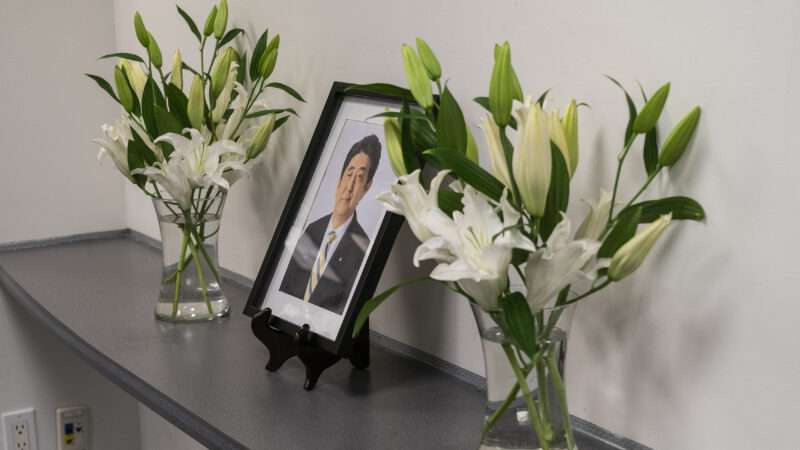
The improvised weapon that an assassin used to murder former Japanese Prime Minister Shinzo Abe last Friday suggests both the impact and the limitations of strict gun laws that make it nearly impossible to legally possess firearms. If it were easier to buy a gun in Japan, the killer presumably would not have resorted to a homemade, jerry-rigged device consisting of two metal tubes bound together with electrical tape. At the same time, the incident demonstrates that no amount of legislation can prevent someone from obtaining a firearm if he is determined to do so.
Abe's killer constructed a double-barreled weapon that was about 16 inches long, capable of firing two rounds without reloading. The New York Times reports that "it is unknown what kind of ammunition was used." But in a video of the assassination, "two shots can be heard, approximately two and a half seconds apart, with a deep report that suggests they came from a cartridge such as those fired by a shotgun commonly used by civilian hunters." The Guardian reports that police found "several similar homemade weapons" in the killer's home.
While they are less reliable and accurate than factory-produced firearms, such guns can be readily made with materials commonly available from hardware stores. A bigger investment is required for more satisfactory results. But even without prefabricated parts, Reason's J.D. Tuccille notes, a CNC mill like the Ghost Gunner 3 "can turn a raw block of metal into an AR-15 receiver." People also can "use widely available designs to craft a firearm with 3D printers," with results somewhere between the two other options.
"Japan has exceptionally strict regulations that prohibit the average citizen from obtaining a factory-manufactured firearm," the Times notes. "Civilian ownership of firearms, except for those used for hunting purposes, is generally prohibited by the country's Firearms and Swords Control Law."
Times reporter Max Fisher suggests that the assassination, which might look like a failure of Japanese-style gun control, "is a reminder of, and maybe even underscores, those restrictions' success." He notes that the attack was shocking not just because of the high-profile target but also because gun violence is extremely rare in Japan, where civilians owned an estimated 377,000 registered and unregistered firearms in 2017, or about 1 per 300 people. The U.S. ratio at the time was estimated to be about 1.2 per resident, or 400 times as high. Taking into account gun sales since then, the current U.S. ratio is even higher.
That comparison reflects a stark difference in public policies, but it also reflects a stark difference in the facts that policy makers must contend with. Even leaving aside the constraints that the Second Amendment imposes on gun control in the United States, the fact that Americans already own more than 400 million firearms means that copying Japan's approach is not a feasible option.
That reality also means that politically possible options—including widely popular proposals such as "red flag" laws, bans on particular kinds of guns or magazines, and expanded background checks for gun buyers—will have only a marginal impact on access to firearms in the United States. Furthermore, that impact will be felt most by peaceful, law-abiding Americans, since criminals are highly motivated to obtain weapons and have many extralegal ways to get them.
Keeping those points in mind, what does Japan's experience tell us about the effectiveness of gun control? "The country experiences fewer than 10 gun deaths nationwide in most years, compared to tens of thousands in the United States," Fisher writes. "Since 2017, Japan has recorded 14 gun-related deaths, in a country of 125 million people."
Fisher overstates the annual number of firearm homicides in the United States, which in the decade from 2011 through 2020 averaged about 10,500. But he is certainly right that people kill each other with guns much more often in the United States than in Japan. And not just with guns.
In 2017, Japan had the world's lowest homicide rate: 0.2 per 100,000 people, compared to 5.3 per 100,000 in the United States. Nearly 11,000 of the more than 15,000 murders recorded in the U.S. that year, or about 73 percent, involved firearms. Even if none of those gun murders had happened, in other words, the U.S. homicide rate still would have been more than seven times as high as Japan's. And taking into account substitution of weapons, even the impossible feat of eliminating all civilian-held firearms would leave an even larger gap between the two countries.
The relative prevalence of guns clearly is not enough to explain the enormous difference in lethal crime between Japan and the United States. That much is also apparent from comparisons between Japan and other countries with strict gun laws. The homicide rates in Australia, Germany, and the U.K., for example, are several times as high as the homicide rate in Japan, although still a fraction of the U.S. rate. In Russia, which has gun laws substantially stricter than the ones Americans face, homicides are even more common than in the United States.
Japan's gun restrictions do not explain why murders committed with alternative weapons, including knives and blunt objects as well as homemade firearms, are so unusual in that country. Japan's remarkable peacefulness clearly goes far beyond the firearm regulations its legislators have decided to impose.
"Pressure to conform and internalized willingness to do so are much stronger in Japan than in America," Independence Institute gun policy scholar David Kopel noted three decades ago. Kopel argued that "the spirit of conformity provides the best explanation for Japan's low crime rate."
Japan stands out in another way: Its suicide rate is relatively high. In 2019, the rate in Japan was 14.6 per 100,000 people, compared to 13.9 per 100,000 in the United States, 10.5 per 100,000 in Canada, 8.5 per 100,000 in the U.K., and 4.6 per 100,000 in Greece. When it comes to suicide, the scarcity of firearms in Japan does not seem to have had the effect you might expect.
In any case, the urge to defend Japan's firearm restrictions after Abe's assassination, while predictable in the context of the U.S. gun control debate, is beside the point when it comes to practical policy discussions. The same "spirit of conformity" that Kopel saw as important in explaining Japan's low crime rate, he suggested, "also explains why the Japanese people accept strict gun control." By contrast, he said, "a gun ban in America similar to that in Japan would be alien to our society, which for over 300 years has had the world's strongest gun culture." He argued that "Japan's gun laws are part of an authoritarian philosophy of government that is fundamentally at odds with America's traditions of liberty."
Whether or not you buy that analysis, more than 400 million facts on the ground vastly complicate any practical lessons that American policy makers can draw from Japan. Neither those facts nor the constitutional constraints imposed by the Second, Fourth, and Fifth Amendments can be wished away, no matter how much American gun control enthusiasts might like to pretend otherwise.
The post Japan's Gun Restrictions Are Far From Sufficient To Explain Its Low Crime Rate appeared first on Reason.com.







